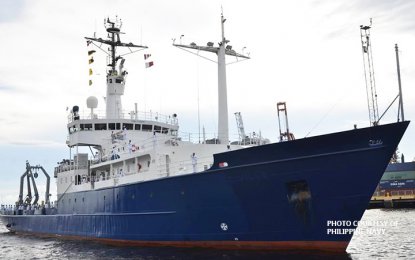News
Filipino scientists competent to do marine research in PH Rise
MANILA — With President Rodrigo R. Duterte sending off a team of Filipino scientists to the Philippine Rise on May 15, a professor from the University of the Philippines (UP) assured that Filipinos have the expertise to conduct marine scientific research (MSR) in the area.
“Yes, indeed we have the technical capability, meaning, the expertise,” said Dr. Mario Aurelio, director of UP’s National Institute of Geological Sciences, in an interview with ABS CBN News Channel (ANC) on Wednesday.
Aurelio said Filipino scientists and marine researchers have been exploring the 13-million-hectare underwater plateau off Aurora province long before it was renamed by Duterte from Benham Rise to Philippine Rise, a year ago on May 16 through Executive Order No.
25.
“Perhaps in the past, there was no awareness. The awareness then was not as high as now,” he said.
Aurelio said the government is contemplating to acquire marine research vessels to boost the capability of Filipino marine science researchers.
He said the plan is the subject of the ongoing roundtable discussions participated in by all sectors in the marine scientific research and exploration.
“At present, the Philippines does not have a comprehensive agenda that would incorporate all the sectors or all the perspective of scientific research from solid earth to atmospheric to meteorological,” Aurelio said.
“And so the objective of this, what we call roundtable discussions now, is geared towards establishing the National Marine Research Agenda,” he added.
Aurelio said the National Marine Research Agenda (NMRA) would include capability building, such as the acquisition of equipment, for instance research vessels and underwater drones or remote operated vehicles.
He said the budget component is another important part of the establishment of NMRA, which could be done through an executive order by the President.
“For now, we are thinking of the format of an executive order so that in the executive order, the budget goes together with the agenda,” he said.
At present, Aurelio said, some marine scientific research institutions have to rely on funding agencies for budget, which “is not really very good.”
He said one MSR abroad would cost USD50,000 to USD75,000 (PHP3.8 million) a day while at least PHP5 billion would be needed to acquire a marine research vessel.
In the MSR at the Philippine Rise, Aurelio said the Filipino scientists will be on board BRP Gregorio Velasquez, a four-decade-old research vessel donated by the United States.
The BRP Gregorio Velasquez left Albay last Thursday with a team of marine scientists on board, though a formal send-off ceremony will take place in Casiguran on May 15.
“They will go northwards towards Benham Rise. It’s estimated about within three weeks from today. I think they are finishing on the 27th. That’s three weeks to travel and conduct survey,” Aurelio said.
Duterte will lead the commemoration of the renaming and send-off of the government’s national MSR program for 2018, but will not proceed to the Philippine Rise.
In 2012, the United Nations Commission on the Limits of the Continental Shelf validated the Philippines’ submission to an extended continental shelf in the Philippine Rise region from 200 nautical miles to 350 nautical miles, covering an area of 24.4 million hectares.
The Philippines presented scientific and technical evidence, such as geodetic, bathymetric, geophysical, and geological data from national government agencies and international sources to support its claim.
In the MSR in the Philippine Rise, Aurelio said the oceanographic expedition aims “to understand several processes that occur in the oceans.”
“Essentially on oceanography, they study ocean currents and also the chemistry of the waters, like salinity and some other components,” Aurelio said.
He said the results of the MSR will be very useful for the fisheries sector in the country.






















